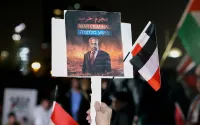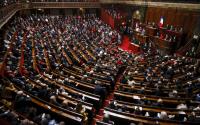Burhan WazirSunday February 9, 2003
If half a million people pour on to the streets of London next week to protest about the prospect of war in Iraq, as many are now predicting, John Rees will have reason to be pleased with himself. He is among a tiny handful of people behind one of the most rapidly growing and widely based protest movements to emerge in Britain since the war.
Rees is a key organiser behind the Stop The War Coalition. As he sits and mass-emails the coalition's daily information updates at the organisation's Brick Lane headquarters, he explains its workings. Email addresses are passed on to like-minded groups and activists who have donated around £100 each to the organisation's advertisements and fliers. Mass mail-outs are then sent out to attract support, disseminate information and rebuke what is considered propaganda.
Over the past 18 months, the coalition, chaired by Andrew Murray, a former journalist and trade union official, has established itself at the forefront of the anti-war movement in the UK. Each week the organisation gathers people at small town hall meetings, churches and mosques throughout Britain. People have, for the most part, then organised themselves. A snowball effect has resulted. Nearly 200 coaches have been booked to ferry supporters into the capital.
As well as emails, organisers have used text messaging, professionally designed adverts and computer banking techniques to raise cash. 'The volume of emails - 1,000 a day - is particularly difficult to keep up with,' said Rees.
So too is the lack of experience of many of the would-be marchers. 'Many people have never attended a march before. They have no idea of what to do. So they organise themselves slowly. Whereas before five people were turning up at these small meetings, these days it's closer to 100.'
Many attending the rally are political debutantes who have been persuaded after seeing the organisation's full-page adverts in newspapers. Ruth Linnett, 27, an actress from Mitcham, has never attended a rally before.
'There are quite a few issues I have felt strongly about in the past,' she said. 'A number of my friends are also going on the march. This is something that could have implications for all of us for the rest of our lives.'
Aura Ghanieri, 19, studying in London, was born on Long Island, New York. She has never attended a rally before. 'I want to help the cause,' she said. 'I hope I will be able to stop this war. This is unjust, immoral and illegal. As for the fresh evidence last week: I didn't believe any of it. It was all fuzzy pictures and bad videos.'
Those marching next Saturday span all ages and social backgrounds. Dan Goldwater, 13, said he was persuaded to join the march by talking to his schoolfriends. 'I'm strongly against the war, and I would like to demonstrate that. My friends and I think that the inspectors need more time. All countries should be disarmed, and that includes America and Britain.'
As with any anti-war collation, STW has attracted supporting groups from all walks of British life. The Liverpool Dockers Shop Stewards Committee, the Arab Organisation of Human Rights, the Black Racial Attack Independent Network, the British Humanist Association, Globalise Resistance, the London Council of Mosques, Roman Catholics and Church of England groups are all represented. Despite differences in emphasis, the organisers are confident that marchers will be united behind one main goal, to stop the war
As with any march of this nature, the police have made some extensive preparations. Around 1,300 officers will be out in force on the day, backed up by helicopters with cameras and CCTVs. 'The main concerns is for this march to pass off safely and without any trouble. The organisers have been very cooperative,' said Deputy Assistant Commissioner Andy Trotter.
Commentators believe the march has all the prospects of becoming a pivotal moment in the run-up to any war on Iraq.
Eric Hobsbawm, the historian and writer, told The Observer: 'Next week's march very much goes against the theory that people are not interested in politics anymore. Of course, you cannot expect the march to achieve anything such as a change of policy but with an obviously large turn-out expected, most people will be very encouraged. It will show them that popular protest is very much alive.'






